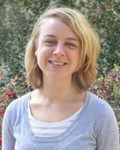Visiting Scholar, Ph.D. student at Humboldt University Berlin, Germany
School of Education
March 1, 2014
Researches Impact of Education Environments on Immigrant Children’s Achievement
Camilla Rjosk is a Ph.D. student at the Institute for Educational Quality Improvement at Humboldt University Berlin, Germany. She is visiting the School of Education to work together with Jacquelynne Eccles.
Ms. Rjosk received her diploma in psychology from Free University Berlin. During her undergraduate studies she worked as a student assistant at the Center for Educational Research of the Max Planck Institute for Human Development. Since 2011 she has been working as a researcher at the Institute for Educational Quality Improvement, Humboldt University Berlin, with the projects “Standards of Education in English required for the Higher School Leaving Certificate” and “French as First Foreign Language in Secondary Level I.” In 2012 she became an external fellow of the International Max Planck Research School on the Life Course (LIFE, participating institutions: Max Planck Institute for Human Development, Free University Berlin, Humboldt University Berlin, University of Michigan, University of Virginia, University of Zurich).
Throughout her studies and research experiences Ms. Rjosk developed a strong interest in educational research, with a special focus on the educational achievement of students with an immigrant background within the German education system. In her diploma thesis she analyzed teachers’ diagnostic skills in estimating basic reading capacities of students with and without an immigrant background. Her dissertation project deals with educational gains of students with and without immigrant backgrounds, focusing on potentially beneficial and detrimental conditions of learning environments. She is investigating the relevance of classroom composition for instructional quality as well as for student achievement and motivational development.
Publications
Rjosk, C., Richter, D., Hochweber, J., Lüdtke, O., Stanat P., & Klieme, E. (in press). Socioeconomic and language minority classroom composition and individual reading achievement: The mediating role of instructional quality. Learning and Instruction (2014), http://dx.doi.org/10.1016/j.learninstruc.2014.01.007
Limbird, C. K., Maluch, J. T., Rjosk, C., Stanat, P., & Merkens, H. (2013). Differential growth patterns in emerging reading skills of Turkish-German bilingual and German monolingual primary school students. Reading and Writing, published online 22 September 2013. doi: 10.1007/s11145-013-9477-9
McElvany, N., & Rjosk, C. (2013). Wann kann Kompetenzdiagnostik negative Auswirkungen haben? [When may competence assessment have negative effects?] Zeitschrift für Erziehungswissenschaft, 16, 65-70. doi: 10.1007/s11618-013-0387-z
Wäckerle, M., Tesch, B., & Rjosk, C. (2012). Kompetenzorientierte Lernaufgaben für die gymnasiale Oberstufe. Konzeption, Innovation, Erprobung. [Skills-based learning tasks for upper secondary level education. Concept, innovation and field trials.] In M. Bär, A. Bonnet, H. Decke-Cornill, A. Grünewald & A. Hu (Eds.), Globalisierung – Migration – Fremdsprachenunterricht. Dokumentation zum 24. Kongress für Fremdsprachendidaktik der Deutschen Gesellschaft für Fremdsprachenforschung (DGFF) Hamburg, 28. September – 1. Oktober 2011 (pp. 369-381). [Globalization – migration – foreign language learning. Documentation of the 24th conference of the German Society of Foreign Language Research.] Baltmannsweiler: Schneider-Verlag Hohengehren.
Rjosk, C., McElvany, N., Anders, Y., & Becker, M. (2011). Diagnostische Fähigkeiten bei der Einschätzung der basalen Lesefähigkeit ihrer Schülerinnen und Schüler [Teachers’ diagnostic skills in estimating students’ basic reading capacities]. Psychologie in Erziehung und Unterricht, 58, 92-105.
Lintorf, K., McElvany, N., Rjosk, C., Schroeder, S. Baumert, J. Schnotz, W., Horz, H., & Ullrich, M. (2011). Zuverlässigkeit von Lehrerurteilen – Reliabilität verschiedener Urteilsmaße bei Einschätzung von Aufgabenschwierigkeiten [Reliability of diagnostic judgements by teachers when assessing task difficulty]. Unterrichtswissenschaft, 39(2), 102-120.
